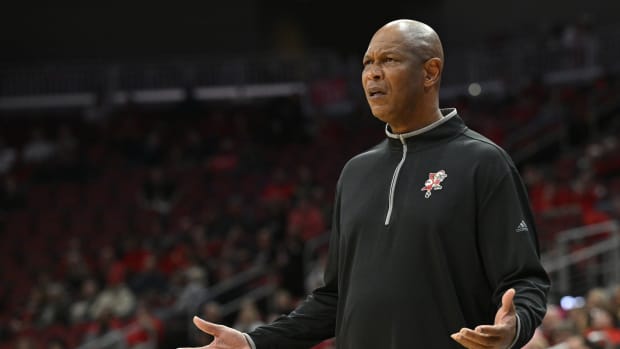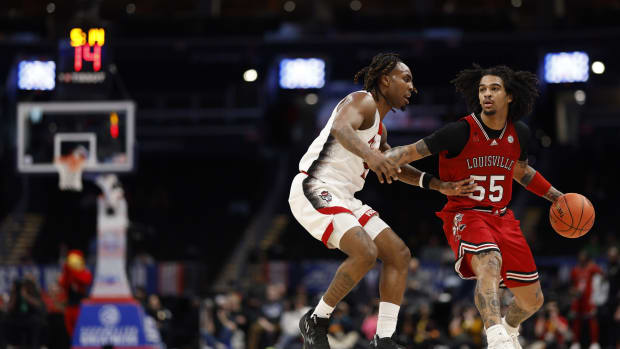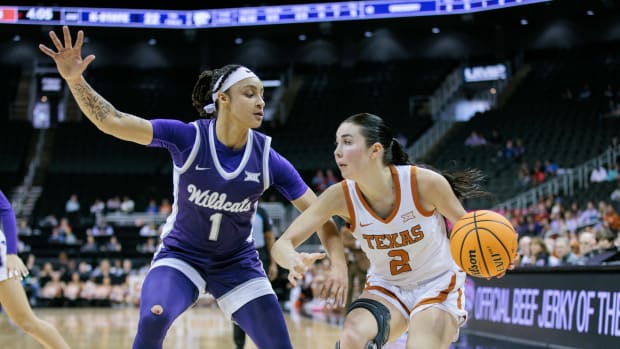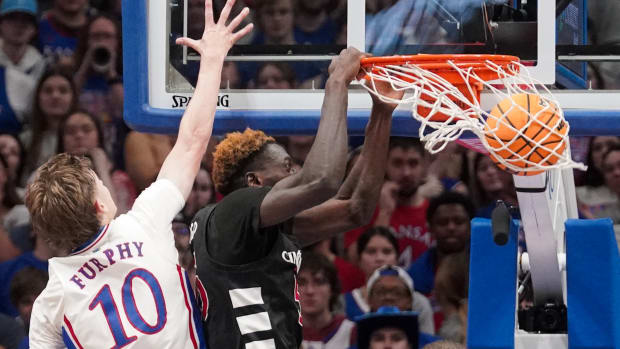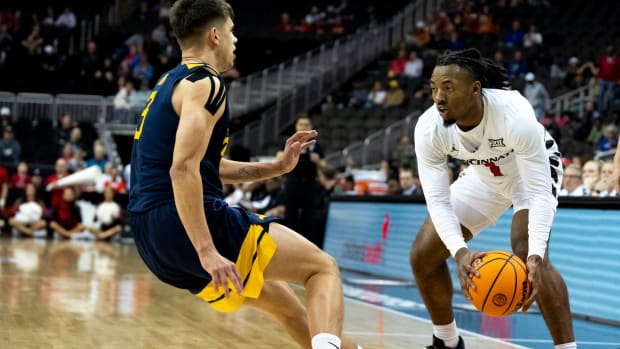Devonte' Graham's Winding Road to Becoming Kansas's Steadying Force
Over 15 seasons at Kansas, Bill Self has repeatedly overcome one of the most difficult challenges that college head coaches face: replacing great players. From Wayne Simien to Sherron Collins to Ben McLemore to Frank Mason III and everyone in between, Self has regularly lost key offensive and defensive contributors, either to the NBA draft or graduation, while keeping the Jayhawks at the top of the Big 12.
This season figured to present a particularly difficult test of Self’s roster management ability. Not only were the Jayhawks waving farewell to three starters, including consensus National Player of the Year Mason and No. 4 NBA draft pick Josh Jackson, from a team that claimed a No. 1 seed in the NCAA tournament and won 31 games, but their top-rated recruit, five-star power forward Billy Preston, signed with a professional team in Bosnia and Herzegovina in January after questions about his eligibility relegated him to the sidelines.
The biggest reason Kansas was able to smoothly navigate the roster churn is Devonte’ Graham, a 6'2", 185-pound senior guard who propelled the Jayhawks to their third consecutive season with more than 30 wins and a No. 1 seed, earning a share of the Big 12 regular-season championship for the 14th consecutive year, which broke the record set by UCLA from 1967 to ’79. With efficient scoring, shrewd playmaking and a marathon workload, Graham helped paper over the weak spots of a flawed roster. “Look, he’s one of the top five players in America,” Duke head coach Mike Krzyzewski said of Graham.
Oklahoma freshman sensation Trae Young may have captivated the college basketball-watching public with his volcanic scoring outbursts and Steph Curry-like rainbow jumpers, but Graham was a superior performer during league play in the nation’s deepest conference. Against Big 12 competition, Graham hit 40.8% of his 130 three-point attempts; scored 18.7 points per game, a 5.1-point increase from last season; attempted 6.5 free throws per game, a 3.8-attempt increase; and assisted on 32.4% of his teammates’ baskets while he was on the court, an 11.2-percentage point increase. By the way, he was on the court almost all of the time, logging 39 or 40 minutes in 14 of 18 conference games.
Watch Graham hurtle through the lane and finish over a defender or dime up a teammate for an open three, and it’s hard to imagine an alternate timeline where Graham is playing for a nondescript mid-major in his home state and watching a program of Kansas’s stature on TV in awe. Graham’s grassroots program, Garner Road, has produced a handful of high-profile prospects, but he wasn’t as coveted as many other guards in his recruiting class. During the fall of his senior year at Broughton High School in Raleigh, N.C., Graham signed a National Letter of Intent with Appalachian State, which had finished near the bottom of the Southern Conference the previous year. “There was no doubt in anybody’s mind who saw him play as a high school senior,” said Garner Road director Dwayne West, that Graham was “definitely a legitimate major-college basketball player.”
Graham came to realize that he was good enough to play for bigger programs, so he asked for a release from his NLI. Appalachian State head coach Jason Capel refused to grant it, and Graham decided to spend a post-graduate year at New Hampshire prep powerhouse Brewster Academy, where he shared a backcourt with NBA Rookie of the Year candidate Donovan Mitchell. After Appalachian State fired Capel, the school released Graham, freeing him to contact coaches interested in recruiting him. Graham eventually chose Kansas over NC State. According to Self, Graham was not on the Jayhawks’ radar before arriving at Brewster, but “we became very aware of him after watching Brewster play.”
After coming off the bench in his first season at Kansas, as a sophomore Graham emerged as an efficient, low-usage perimeter scorer. The next season, Graham earned second-team all-Big 12 honors while deferring to Mason, but Kansas was unexpectedly bounced from the NCAAs when, as a No. 1 seed playing a de facto home game in Kansas City, it fell to No. 3 seed Oregon, ending both Mason’s and Jackson’s college careers. Self leaned on Graham to help fill the sizable production void that duo and starting forward Landen Lucas left behind. The Jayhawks’ recent switch to a more perimeter-oriented offense made Graham’s transition into their primary option this season a bigger step up in responsibility than it would have been earlier in Self’s coaching tenure.
Graham managed it deftly. He assumed a much bigger share of Kansas’s offense without a significant drop in efficiency, upping the percentage of his team’s plays he used while on the floor during Big 12 play to 24.9 from 18.1. He facilitated more scoring opportunities for his teammates, increasing his assist rate to 32.4 from 21.2. He shot more accurately from the free-throw line and behind the three-point line, raising his make-rate from the stripe to 82.9% from 79.6% and from beyond the arc to 40.8% from 39.4%. “Coach Self believing in me once I got here at Kansas, probably towards the end of my freshman year, is when I really started to believe that I could do something special here at Kansas,” Graham said. “And him and the coaching staff just believing in me and the guys that I was around at the time when I came in and really just helped me become the player I am today.”
Graham had a knack for delivering big plays in make-or-break moments this season. With Kansas up by two in the final minute of a late-February game at Texas Tech, Red Raiders guard Jarrett Culver bumped Graham by the three-point line as he began to drive toward the basket, but Graham kept his balance, cut into the lane and seemed to temporarily lose control of the ball while rising up for a contested layup that rattled in for a four-point lead the Jayhawks wouldn’t give up, clinching the Big 12 regular-season title in the process.
About a month later, Graham kept Kansas’s season alive with a pivotal pass. Trailing by three in the final minute of an Elite Eight battle with Duke in Omaha, Graham used a behind-the-back dribble to evade Blue Devils wing Gary Trent Jr., spun around while avoiding a steal attempt from Trevon Duval and found Sviatoslav Mykhailiuk open on the wing for a three-pointer. Mykhailiuk took one dribble to his left, nailed the trey, and Kansas went on to an 85–81 overtime win.
That’s not a complete list, but had Graham not come through when Kansas needed him to time and again, the Jayhawks could have stumbled to one of their worst seasons since Self left Illinois for Lawrence in 2003. Kansas’s top recruit (Preston) never suited up, the Jayhawks don’t have any surefire first-round draft picks, and their frontcourt is so thin that Self added James Sosinski, a 6'7", 250-pound tight end on the football team, to the roster. In early December, after back-to-back losses to one middling Pac-12 team that didn’t make the tourney (Washington) and another that barely did as a No. 11 seed (Arizona State), Self said that “this is the softest team that Kansas has had since I’ve been here.”
The Jayhawks would go on to lose three games at Allen Fieldhouse for the first time under Self, and after an 80–64 defeat at Baylor on Feb. 10 that snapped an 11-game winning streak against the Bears, Kansas seemed in serious danger of losing its grip on the Big 12 crown. But a toe injury to Texas Tech standout Keenan Evans left the door open, and Graham didn’t miss his chance to vault the Jayhawks in front. After the Red Raiders lost two games to inferior opponents (Baylor and Oklahoma State) with Evans hobbled, on Feb. 24 Graham led Kansas into Lubbock—where no visitor had won this season—and proceeded to roast a defense ranked third in Division I by Ken Pomeroy’s adjusted efficiency metric with 26 points and that key contested layup to ice away the game.
[youtube:https://www.youtube.com/watch?v=k7pHSaSo55s]
Graham was duly rewarded for his production by being unanimously voted the Big 12’s Player of the Year and earning first-team All-America honors, but focus on Graham’s numbers and one risks overlooking a factor that’s arguably just as important: His experience and upbeat attitude have helped him grow into the type of leader Kansas may have unraveled without this season. “I think he’s the best intangible guy we’ve ever had here and has as good of leadership qualities as anybody I’ve ever coached,” Self said.
‘DTae’ has a boyish face with a frizzy shock of black hair, an easy confidence and a capacity for producing remarkably transparent free-throw reactions. After Graham missed the front end of a one-and-one during Kansas’s win over Clemson in the Sweet 16, he raised his eyebrows and opened his mouth wide—an expression of disbelief so plain over something so mundane. Two days later, Graham struggled to contain his smile as he pranced across half court after being fouled by Duval with Kansas holding a five-point lead over Duke inside the final 20 seconds of their Elite Eight meeting. Graham composed himself and launched the freebie, but it back-rimmed out. That ultimately didn’t affect the outcome of the biggest game of Graham’s college career to that point. “That’s what you come here for, to play in those moments,” Graham said afterward.
When Graham was at Broughton High, schools like Kansas either didn’t know about him or decided to pass on him. A few years later, the Jayhawks needed Graham to keep them on course as they wobbled through the rough patches of a turbulent season. “When he’s on the court,” Krzyzewski said of Graham, “everybody is better.” Where once there was serious doubt over whether he could even play for a blueblood program, now there’s debate over how highly he ranks on one’s list of all-time greats.

